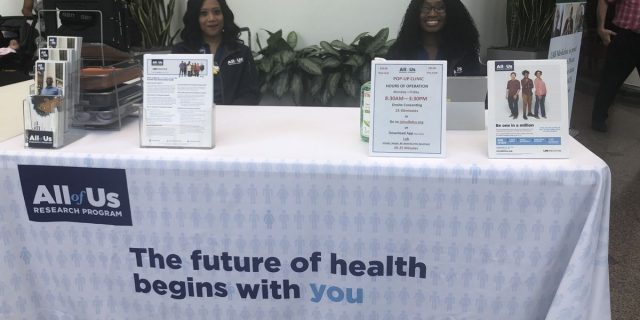The All of Us Research Program offers participants the opportunity to receive information back about their DNA. NIH
The National Institutes of Health’s All of Us Research Program has begun to return genetic results to participants who have donated biosamples for research. This reflects the program’s priority to give back information to its research volunteers. Initially, participants can choose to receive information about their genetic ancestry and traits, with health-related results available at a later date.
The All of Us Research Program is working to build a diverse community of 1 million or more participant partners across the U.S. to help researchers learn more about how genetics, environment and lifestyle factors affect health outcomes. Participants share information in a variety of ways, including surveys, electronic health records, biosamples (blood, urine and/or saliva) and more. Data is stripped of personal identifiers and made available for research through the All of Us Research Hub(link is external).
As part of its core values, the program is committed to ensuring that participants have access to their own information, and many participants have expressed a strong desire to understand what their DNA can tell them.
“We’re changing the paradigm for research,” said Josh Denny, M.D., All of Us’s chief executive officer. “Participants are our most important partners in this effort, and we know many of them are eager to get their genetic results and learn about the science they’re making possible. We’re working to provide that valuable information in a responsible way.”
The program’s in-depth genetic analyses include both whole genome sequencing and genotyping. Whole genome sequencing focuses on the more than 3 billion base pairs in the human genome, while genotyping looks at millions of genetic variants focused on people’s most common genetic differences.
To return genetic information, the program has developed a robust informed consent process, giving participants information and choice about whether or not to receive results and which results they want to get back. The program also provides access to genetic counselors to help answer questions from participants and their health care providers.
All of Us teamed up with a network of awardees across the country to support this work, including the health technology company Color, to return the personalized results on genetic ancestry and traits, and a set of leading genome centers to generate the genetic data: Baylor College of Medicine, the Broad Institute and the Northwest Genomics Center at the University of Washington, alongside their partners.
“With the All of Us Research Program, we’re beginning to return results for a genomics program that is of unprecedented scale,” said Alicia Zhou, Ph.D., chief science officer at Color. “For a long time, the research community has recruited participants into large-population genomics studies without returning any results back to them. With All of Us, we’ve provided the tools to do just that—in a convenient and accessible way. We now have a real opportunity to return value to participants.”
All of Us is taking a phased approach to the return of genetic results and will offer additional results over time. In about a year, the program plans to begin offering participants the option to receive information about how their DNA may affect their body’s response to certain types of medicines (pharmacogenetics), and about genetic variants associated with the increased risk of certain diseases, based on guidelines of the American College of Medical Genetics and Genomics. Participants will receive information back as their DNA samples are processed, so not everyone will receive information immediately.
Since All of Us opened enrollment nationwide in 2018, more than 270,000 people have contributed biosamples and more than 80 percent come from communities that are historically underrepresented in biomedical research. These include racial and ethnic minorities, sexual and gender minorities and other groups.
“We need programs like All of Us to build diverse datasets so that research findings ultimately benefit everyone,” said Brad Ozenberger, Ph.D., All of Us’s genomics director. “Too many groups have been left out of research in the past, so much of what we know about genomics is based mainly on people of European ancestry. And often, genomic data are explored without critical context like environment, economics and other social determinants of health. We’re trying to help change that, enabling the entire research community to help fill in these knowledge gaps.”
All of Us plans to begin making genetic data available to researchers in about a year, with strict privacy and security safeguards in place to protect participants’ information. The program seeks to engage researchers from diverse backgrounds to undertake a wide range of studies and learn more about how to tailor care to people’s different needs.
To learn more about All of Us and to join, visit www.JoinAllofUs.org/UAB.
About the All of Us Research Program: The mission of the All of Us Research Program is to accelerate health research and medical breakthroughs, enabling individualized prevention, treatment, and care for all of us. The program will partner with one million or more people across the United States to build the most diverse biomedical data resource of its kind, to help researchers gain better insights into the biological, environmental, and behavioral factors that influence health. For more information, visit www.JoinAllofUs.org/UAB and www.allofus.nih.gov.
About the National Institutes of Health (NIH): NIH, the nation’s medical research agency, includes 27 Institutes and Centers and is a component of the U.S. Department of Health and Human Services. NIH is the primary federal agency conducting and supporting basic, clinical, and translational medical research, and is investigating the causes, treatments, and cures for both common and rare diseases. For more information about NIH and its programs, visit www.nih.gov.





